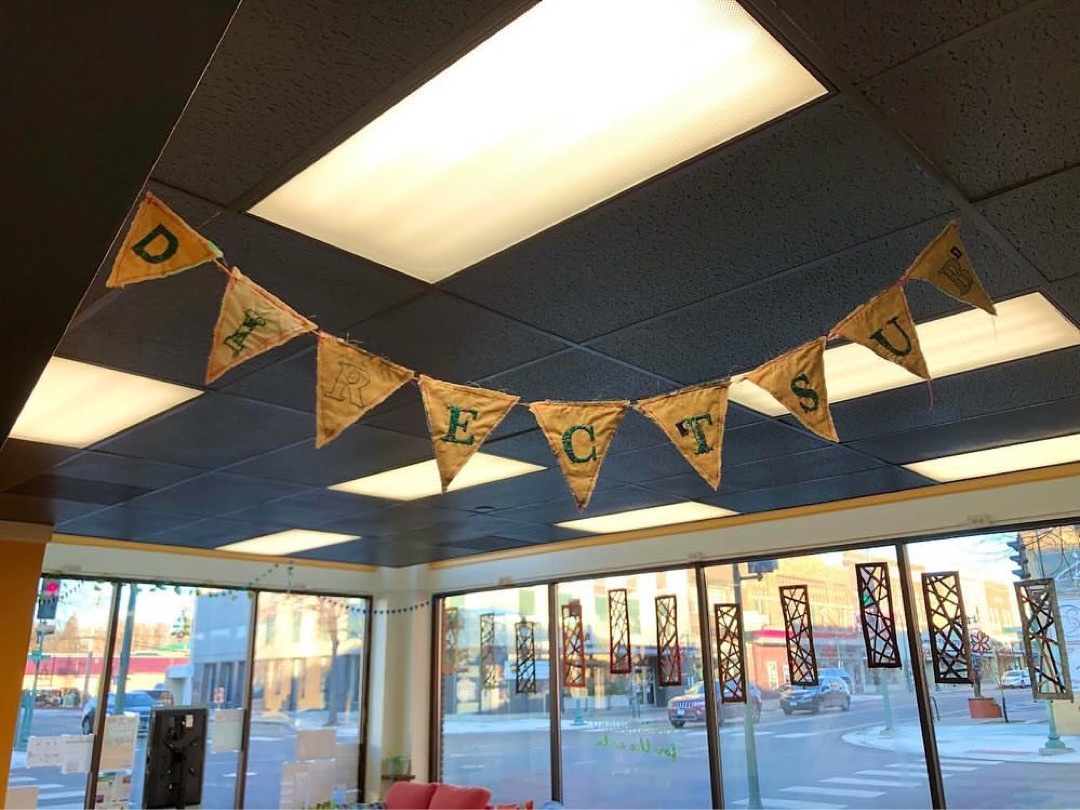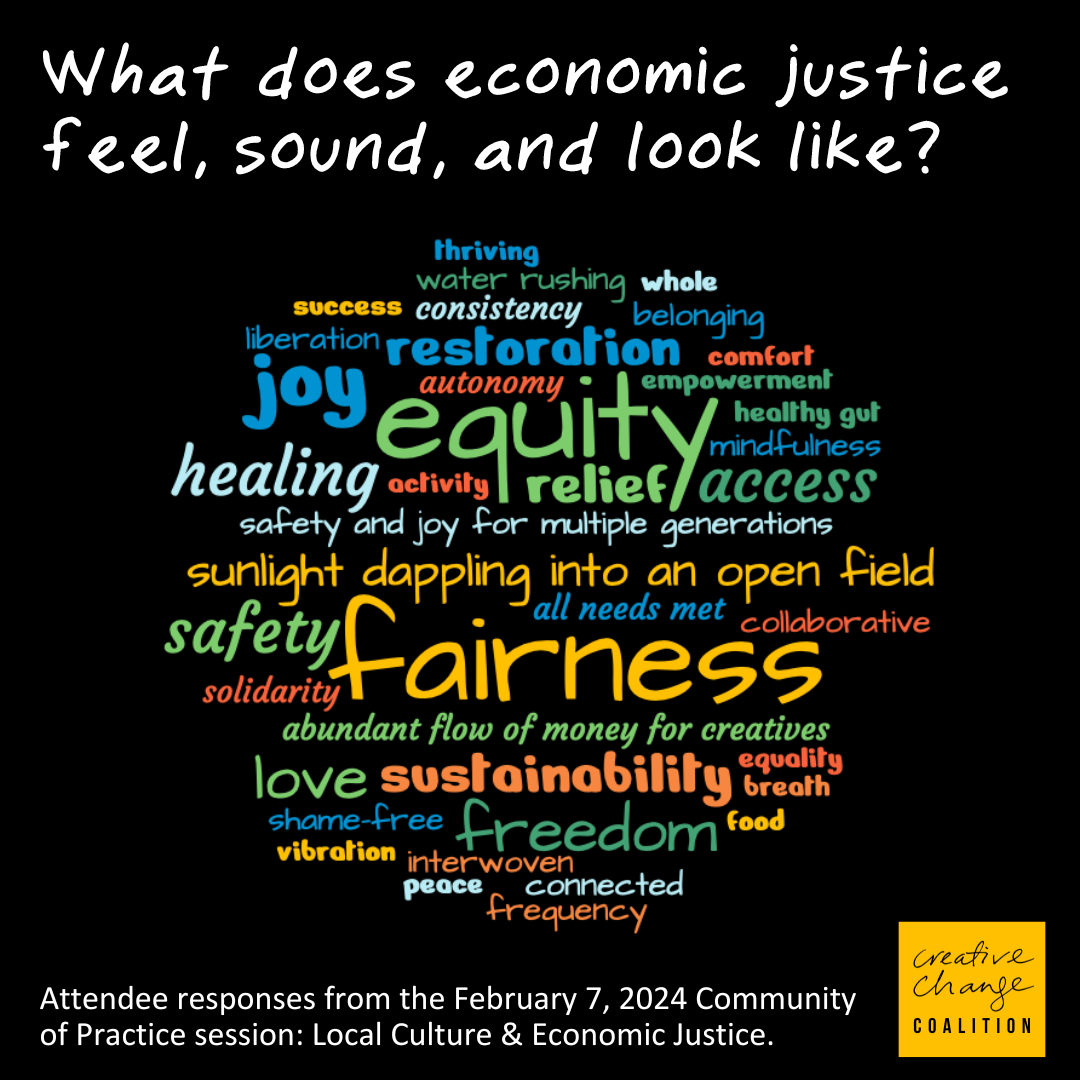Creative Change Coalition: In the Red
“What we’ve been able to do is really situate ourselves in this space I like to describe as joy and justice.” – Tim Lampkin
On Wednesday, February 7, the Creative Change Coalition sat down with three organizations on the leading edge of community wealth building, creative workforce development, and entrepreneurship: Gustavo Herrera (Arts for LA), Dr. Tim Lampkin (Higher Purpose Co), and Esther Robinson (ArtBuilt).
Each shared their unique, place-based approaches to supporting the creative workforce in their communities, and the values driving those projects. From increasing artist wages, to helping creatives buy homes, meet savings goals, or changing the narrative of the local economy, the conversation offered hopeful and practical models for addressing the systemic barriers that our communities face.
Guest artist Kandace Creel Falcón, a visual artist and feminist scholar based in Erhard, MN, also joined the session from Fergus Falls for a live “stitch-in” of their project, “In the Red.” The project is a time-based meditation on the predatory nature of student loan debt that is being progressively installed in Springboard for the Arts’ space in Fergus Falls.

Despite the diverse range of artist communities that Esther, Tim and Gustavo’s organizations are serving, several themes rose to the surface that anyone working on community wealth building and creative workforce development can look to as guidance for creating change in their communities.
Lead from a place of love. Cultivate expansive, trust-based partnerships
Beyond cross-sector partnerships, we need to acknowledge that the arts sector alone is not going to solve the problems of our time. Systems-based change requires people from industries and sectors that have different competencies and expertise, and a belief that collective impact is possible. It’s critical to take time to cultivate the relationships to this work and move at the speed of trust – do you understand the values and goals your partners are bringing? Is there reciprocal trust and generosity? Can you be in community with your partners, beyond the project at hand?
“So many folks say that the arts are not at the table. And part of what I always say in response to that, if the arts are not at the table, we need to set the table.” – Gustavo Herrera
Who decides what is ‘excellent’? Resist competitive models to support financial resilience
One of the big challenges of the arts sector is that both creative workers and the intermediary organizations that support them are set up for competition of resources. This widespread and inequitable under-capitalization leaves little reserve for emergencies and opportunities, and weakens the trust needed to help communities thrive. We need to find new ways to support artists beyond the competitive grant model. Programs like financial coaching, access to business capital, affordable space for artists, matched savings and lending circles are some ways that our presenters, and other organizations, are working to build intergenerational wealth and financial resilience.
You’re Not Going to Get this Building. Interrupt extractive economic systems
Higher Purpose Co. purchased a building in Clarksdale, MI, that had operated as a furniture store for three decades, with the mission to interrupt extractive real estate practices, and pour support, joy, and connection back into the community. The community was invited to activate the space, sharing what they hope for, and has created a ripple effect that is changing both the narrative and the landscape of the local economy. Higher Purpose’s story shows the importance of physical places of “joy and justice,” where community members can share their talents, dream, build, and reimagine about the future, and feel valued.
As the conversation wrapped up, Springboard for the Arts’ Executive Director Laura Zabel invited thoughts or advice on how to toggle back and forth between the urgent needs for support and relief now, and the longer, systemic change and the future we want to make possible.
Reflecting on this question, Gustavo advised that setting dates for your long term goals can help communicate the urgency of an issue. “How do we both address the crises that we’re seeing right now,” he asked “but also leverage, some of the real opportunities that we see on the horizon, for example, the Olympics are coming to LA in 2028, as ways to really catalyze the initiative and thread both the local, the state, and the federal dollars to support our goals?”
Tim emphasized that we can’t move forward and change without healing from the trauma of our community’s past. “We have to recover, we have to talk about this, and ask what’s that road to repair, that oftentimes people don’t want to talk about, that leads to us having more assets and mobility? And I believe that arts and culture are a pathway to doing that.”
“You have to show up for the fights that are not art…the great battles of our time are not always arts battles.” – Esther Robinson
Esther acknowledged that while this is an anguished time, it’s important to be reminded that she’s not carrying the work alone but rather that it’s passing through all of us who are working in solidarity with one another. “It’s a really hard time to do the work. The great benefit of partnering isn’t the programs. The great benefit of partnering is on the days when I don’t feel like I can get up and do the work, I have a friend or a beloved colleague who will call me and tell me something they’re doing and I am immediately like, oh, it IS possible.”

To learn more about the Creative Change Coalition, visit www.creativechangecoalition.org.
Questions about the Coalition? Contact Amanda Cortés, Community Development Program Manager, Springboard for the Arts at: amanda@springboardforthearts.org
Press Inquiries: Contact Destiny Davison, Communications Director, Springboard for the Arts at: destiny@springboardforthearts.org
The Creative Change Coalition is stewarded by Springboard for the Arts with support from the Andrew W. Mellon Foundation and the National Endowment for the Arts.
